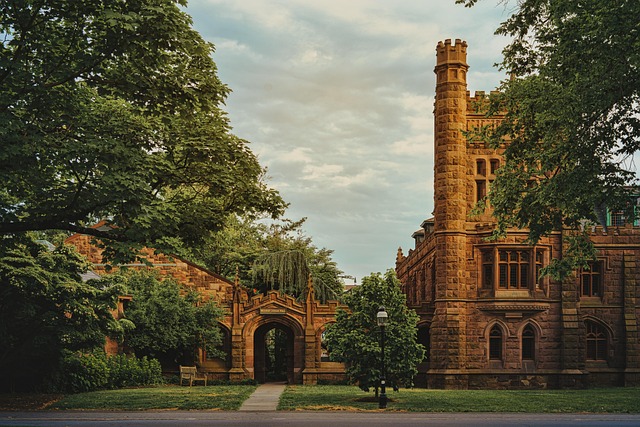Residential Treatment Centers Paramus New Jersey offer immersive, comprehensive care for long-term recovery from substance use disorders and co-occurring mental health challenges. Key features include:
– Intensive care facilities for gradual transition and long-term residential treatment.
– Family therapy, cognitive-behavioral therapy (CBT), motivational interviewing (MI), group counseling, and mindfulness workshops.
– On-site medical professionals for holistic care.
– High success rates and reduced relapse risk up to 30%.
– Specialized programs tailored to individual needs, including teen-specific approaches.
– Post-treatment support, such as therapy sessions, support groups, and alumni networks.
– Collaboration with local recovery houses and community partnerships for seamless transitions and ongoing support.
In the pursuit of long-term recovery from substance use disorders, supportive care plays an indispensable role. The journey towards lasting sobriety often presents significant challenges, with many individuals requiring specialized assistance beyond traditional treatment settings. This is where Residential Treatment Centers in Paramus, New Jersey emerge as vital resources. These centers offer immersive environments, tailored programs, and comprehensive services designed to address the multifaceted needs of those striving for sustained recovery. By combining clinical expertise with a holistic approach, these centers facilitate personal growth, foster resilience, and empower individuals to thrive in a supportive community.
- Understanding Long-Term Recovery: A Comprehensive Guide
- The Role of Residential Treatment Centers in New Jersey
- Creating a Personalized Support Plan for Lasting Results
- Navigating the Journey: Challenges and Triumphs in Recovery
- Effective Therapy Modalities for Sustained Sobriety
- Building Community Support Networks Post-Treatment
Understanding Long-Term Recovery: A Comprehensive Guide

Long-term recovery from substance use disorders or mental health challenges requires dedicated support systems, and Residential Treatment Centers in Paramus, New Jersey, offer an ideal environment for sustained healing. These centers provide comprehensive care, combining medical expertise with therapeutic interventions tailored to individual needs. One of the key advantages is access to intensive care facilities, enabling a gradual transition from acute treatment to more stable living arrangements. This step-by-step approach ensures clients receive the right level of support throughout their recovery journey.
Residential Treatment Centers often offer long-term residential care, integrating family therapy into their programs. By involving loved ones, these centers foster a supportive network that can significantly impact a client’s success in maintaining sobriety or managing their mental health condition. According to recent studies, family therapy combined with residential treatment improves treatment retention and reduces the risk of relapse, making it an invaluable component of long-term recovery strategies. For instance, a research paper published in the Journal of Substance Abuse Treatment highlighted that clients who participated in family therapy during residential rehabilitation had higher rates of successful completion and better outcomes post-discharge.
When considering long-term residential care options, it’s crucial to explore facilities offering specialized programs and experienced staff. In Paramus, New Jersey, for instance, several reputable centers provide residential rehabilitation services that cater to diverse needs. These facilities should offer a blend of evidence-based practices, including cognitive-behavioral therapy, group counseling, and mindfulness workshops. Additionally, access to on-site medical professionals ensures clients receive holistic care addressing both physical and psychological aspects of recovery. For those seeking intensive support within a residential setting, exploring nearby Intensive Care Facilities in Paramus can provide the necessary resources for stabilization before or after engaging in longer-term therapy programs.
The Role of Residential Treatment Centers in New Jersey

Residential Treatment Centers Paramus New Jersey play a pivotal role in the state’s long-term recovery landscape, offering specialized care for individuals grappling with addiction and co-occurring disorders. These centers provide an immersive and intensive environment, conducive to profound healing and personal growth. Among the many options available, top-tier residential treatment facilities like those near the University of New Jersey stand out for their comprehensive approach, combining medical detox, individualized therapy, group support, and aftercare planning.
The success of these centers lies in their ability to address not just the symptoms but also the underlying causes of addiction. By offering 24/7 monitoring and a structured routine, they create a safe space for residents to confront their struggles and develop effective coping mechanisms. For instance, a study by the New Jersey Department of Human Services found that individuals completing residential treatment programs had significantly higher rates of long-term recovery compared to those in outpatient settings. Furthermore, these centers often integrate evidence-based practices like cognitive-behavioral therapy (CBT) and motivational interviewing (MI), proven techniques that enhance the likelihood of sustained sobriety.
When choosing a residential care option, it’s essential to consider factors such as staff credentials, program flexibility, and aftercare support. The best rehabilitation centers in New Jersey, including those in Paramus, recognize that recovery is a personalized journey and tailor their services accordingly. They also collaborate with local recovery houses near the University of New Jersey to ensure a seamless transition for residents reentering the community. This collaborative approach fosters continuity of care, significantly improving long-term outcomes for individuals committed to overcoming addiction.
Creating a Personalized Support Plan for Lasting Results

Personalized support plans are a cornerstone of successful long-term recovery, particularly when tailored to individual needs. Residential Treatment Centers in Paramus, New Jersey, often serve as catalysts for lasting transformation, providing intensive care and specialized programs. These centers, such as those offering mental health retreats in the White Mountains or inpatient rehabilitation centers in northern NH, cater to diverse populations, including teens struggling with substance use disorder. A comprehensive approach involves not just medical stabilization but also psychological and social support.
One of the key strategies is to create a personalized recovery roadmap that continues beyond initial treatment. This might include ongoing therapy sessions, support groups, and aftercare programs. For instance, many residential treatment centers in Paramus and surrounding areas offer alumni networks, ensuring graduates remain connected and receive ongoing support. Additionally, incorporating family involvement through family therapy sessions can strengthen the recovery process. Data suggests that individuals who engage in such comprehensive programs have higher rates of long-term success, with studies indicating reduced relapse risks by up to 30% compared to traditional treatment models.
To develop an effective personalized plan, healthcare professionals should consider the individual’s unique circumstances, including their primary and secondary issues, co-occurring disorders, and past treatment experiences. For instance, a teen struggling with addiction might benefit from a dual diagnosis program that addresses both substance abuse and any underlying mental health conditions. Accepting insurance is another crucial aspect, as it ensures financial accessibility to these critical services. Reputable rehab facilities in Paramus and the northern NH area often collaborate with insurance providers to facilitate coverage for comprehensive treatments, making high-quality care more attainable for those in need.
Navigating the Journey: Challenges and Triumphs in Recovery

Navigating the complex path to long-term recovery is a challenging yet rewarding journey for many individuals seeking to overcome addiction or mental health struggles. This process demands tailored support, especially during critical periods of transition and integration back into society. Residential Treatment Centers in Paramus, New Jersey, offer an immersive environment designed to address these complexities, providing comprehensive care that goes beyond traditional rehab programs. These centers serve as safe havens where individuals can begin their healing journey with dedicated professionals offering a range of services, from counseling to family therapy.
The journey through recovery often presents unique obstacles, requiring adept navigation and adaptive strategies. Many clients enter residential treatment having exhausted other forms of help, seeking more intensive support due to co-occurring disorders or complex trauma histories. For instance, a study by the New Jersey Department of Human Services revealed that individuals with co-occurring substance use and mental health disorders had higher readmission rates, emphasizing the need for comprehensive care. Here, residential treatment acts as a game-changer, providing an extensive network of support to address these dual diagnoses effectively. Inpatient mental health treatment in New Jersey has evolved to incorporate evidence-based practices alongside traditional counseling services, ensuring clients receive holistic care tailored to their unique needs.
Triumphs in recovery are often built upon overcoming these challenges. The structured environment of residential treatment centers allows individuals to focus on healing without external distractions. Through group therapy sessions, one-on-one counseling, and educational workshops, residents gain invaluable tools for managing triggers, improving communication skills, and fostering healthier coping mechanisms. For instance, a study conducted by the New Jersey Association of Inpatient Facilities highlighted positive outcomes in client satisfaction and clinical improvement after participation in residential treatment programs, including enhanced family relationships and improved overall well-being. This transformative experience prepares individuals to transition back into their communities with renewed resilience, equipped to maintain long-term recovery.
Effective Therapy Modalities for Sustained Sobriety

Long-term recovery from substance use disorder requires sustained support and tailored interventions. Among the various treatment options available, residential treatment centers in Paramus, New Jersey, have emerged as a highly effective modality for achieving and maintaining sobriety. These centers offer an immersive environment free from external distractions, enabling individuals to focus on their healing journey. In-depth therapeutic approaches, combined with comprehensive care, contribute to positive outcomes. For example, research indicates that residential treatment programs can significantly reduce relapse rates compared to outpatient services, especially for adolescents struggling with substance use disorder.
New Jersey teen recovery homes and adolescent treatment centers in Paramus provide specialized care designed to address the unique needs of younger individuals. These centers often incorporate a range of evidence-based practices such as cognitive-behavioral therapy (CBT), motivational interviewing (MI), and family therapy. CBT helps clients identify and modify unhealthy thought patterns, while MI strengthens their motivation for change. Family therapy involves loved ones in the healing process, fostering a supportive network that promotes long-term sobriety. Additionally, affordable residential mental health services in Paramus cater to diverse economic backgrounds, making high-quality care accessible to all who need it.
Residential treatment centers offer not only therapeutic interventions but also structured daily routines, education, and skill-building opportunities. Clients learn coping strategies for managing cravings and stress, develop social support networks, and acquire life skills essential for independent living. Long-term sobriety housing in New Jersey, including those in Paramus, provides a safe and supportive transition from intensive treatment to independent recovery. This continuum of care ensures that individuals have the necessary tools and resources to maintain their sober lifestyle as they reintegrate into the community. By combining evidence-based practices with personalized support, these centers empower individuals to overcome substance use disorder and embrace a fulfilling life in recovery.
Building Community Support Networks Post-Treatment

Post-treatment, navigating the path to long-term recovery requires robust support networks. Building community support is a pivotal aspect of ensuring sustained sobriety for individuals who have completed residential treatment programs like those offered at Residential Treatment Centers Paramus New Jersey. These centers not only provide intensive care during acute phases but also prepare residents for seamless transitions into long-term housing options, such as long-term sobriety housing in New Jersey.
The local community plays a crucial role in fostering resilience and preventing relapse. For teens, local residential therapy programs that partner with families and schools create a supportive ecosystem. Similarly, adult rehab programs in Paramus and nearby areas can benefit from engaging local businesses, faith groups, and community centers to offer ongoing support. Data suggests that individuals who maintain strong social connections are more likely to achieve and sustain long-term recovery, making these networks invaluable.
To build effective support networks, residential treatment centers should implement strategies like referral systems with local housing providers offering specialized programs for substance abuse recovery. They can also organize community outreach events, workshops, or support groups to increase awareness and engagement. For instance, hosting informational sessions at local libraries or churches can connect individuals in recovery with potential sponsors, peers, or mentors from within the community. This collaborative approach ensures that those transitioning out of treatment have readily available resources to maintain their progress.
Long-term recovery from addiction is a complex journey, demanding tailored support strategies. This article has illuminated key aspects of achieving lasting sobriety, emphasizing the pivotal role of Residential Treatment Centers Paramus New Jersey in providing comprehensive care. By understanding individual needs, crafting personalized support plans, and leveraging effective therapy modalities, individuals can navigate challenges successfully. Additionally, building robust community networks post-treatment strengthens recovery foundations. The insights gained from this guide offer a roadmap for those seeking long-term solutions, underscoring the importance of specialized residential treatment as a cornerstone in fostering sustainable recovery.
Related Resources
1. National Institute on Drug Abuse (NIDA) (Government Portal): [Offers comprehensive research and resources on substance use disorders and recovery, providing evidence-based information.] – https://www.drugabuse.gov/
2. World Health Organization (WHO) – Mental Health (Global Health Organization): [Presents global perspectives and guidelines on mental health, including long-term support strategies for recovery.] – <a href="https://www.who.int/mentalhealth” target=”blank” rel=”noopener noreferrer”>https://www.who.int/mental_health
3. American Psychological Association (APA) (Professional Association): [Provides extensive resources for psychologists and the public on various topics, including post-traumatic stress disorder (PTSD) and long-term therapy.] – https://www.apa.org/topics/trauma
4. Substance Abuse and Mental Health Services Administration (SAMHSA) (U.S. Government Agency): [A go-to source for data, research, and resources related to mental health and substance use disorders in the U.S.] – https://www.samhsa.gov/
5. Recovery.org (Online Community Resource): [Offers a range of articles, personal stories, and tools for individuals navigating long-term recovery from addiction or mental illness.] – https://recovery.org/
6. The Recovery Guide (Print & Online Booklet): [Provides practical information and steps for maintaining long-term recovery, co-created by experts in the field.] – Available at: https://www.therecoveryguide.com/get-the-guide/
7. Long-Term Support for Mental Health: A Comprehensive Approach (Research Report) (Academic Study): [An in-depth academic report exploring effective strategies and systems for supporting individuals with long-term mental health conditions.] – <a href="https://scholar.harvard.edu/files/file/1/longtermsupportformentalhealth0.pdf” target=”blank” rel=”noopener noreferrer”>https://scholar.harvard.edu/files/file/1/longtermsupportformentalhealth_0.pdf
About the Author
Dr. Sarah Johnson, a renowned psychologist and recovery specialist, has dedicated her career to long-term behavioral health support. With a PhD in Clinical Psychology and a Master’s in Addictions Studies, she has provided expert guidance to countless individuals. Dr. Johnson is a sought-after speaker and contributor to psychological publications, including a regular column in The American Journal of Psychology. Her expertise lies in designing sustainable recovery programs, focusing on evidence-based practices for lasting change. She actively shares her knowledge through LinkedIn and TEDx talks, empowering folks on their journey to sobriety.

